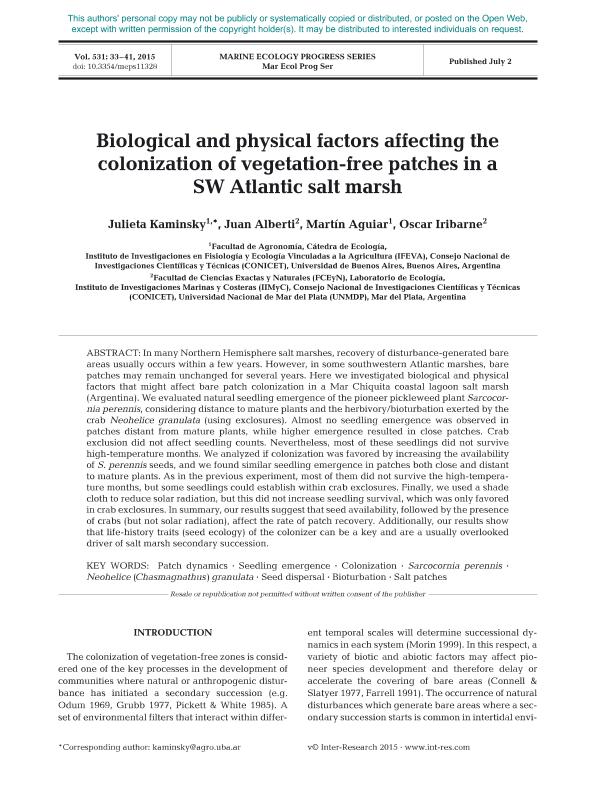Mostrar el registro sencillo del ítem
dc.contributor.author
Kaminsky, Julieta

dc.contributor.author
Alberti, Juan

dc.contributor.author
Aguiar, Martin Roberto

dc.contributor.author
Iribarne, Oscar Osvaldo

dc.date.available
2018-07-04T16:50:39Z
dc.date.issued
2015-07
dc.identifier.citation
Kaminsky, Julieta; Alberti, Juan; Aguiar, Martin Roberto; Iribarne, Oscar Osvaldo; Biological and physical factors affecting the colonization of vegetation-free patches in a SW Atlantic salt marsh; Inter-Research; Marine Ecology Progress Series; 531; 7-2015; 33-41
dc.identifier.issn
0171-8630
dc.identifier.uri
http://hdl.handle.net/11336/51207
dc.description.abstract
In many Northern Hemisphere salt marshes, recovery of disturbance-generated bare areas usually occurs within a few years. However, in some southwestern Atlantic marshes, bare patches may remain unchanged for several years. Here we investigated biological and physical factors that might affect bare patch colonization in a Mar Chiquita coastal lagoon salt marsh (Argentina). We evaluated natural seedling emergence of the pioneer pickleweed plant Sarcocornia perennis, considering distance to mature plants and the herbivory/bioturbation exerted by the crab Neohelice granulata (using exclosures). Almost no seedling emergence was observed in patches distant from mature plants, while higher emergence resulted in close patches. Crab exclusion did not affect seedling counts. Nevertheless, most of these seedlings did not survive high-temperature months. We analyzed if colonization was favored by increasing the availability of S. perennis seeds, and we found similar seedling emergence in patches both close and distant to mature plants. As in the previous experiment, most of them did not survive the high-temperature months, but some seedlings could establish within crab exclosures. Finally, we used a shade cloth to reduce solar radiation, but this did not increase seedling survival, which was only favored in crab exclosures. In summary, our results suggest that seed availability, followed by the presence of crabs (but not solar radiation), affect the rate of patch recovery. Additionally, our results show that life-history traits (seed ecology) of the colonizer can be a key and are a usually overlooked driver of salt marsh secondary succession.
dc.format
application/pdf
dc.language.iso
eng
dc.publisher
Inter-Research

dc.rights
info:eu-repo/semantics/openAccess
dc.rights.uri
https://creativecommons.org/licenses/by-nc-sa/2.5/ar/
dc.subject
Bioturbation
dc.subject
Colonization
dc.subject
Neohelice (Chasmagnathus) Granulata
dc.subject
Patch Dynamics
dc.subject
Salt Patches
dc.subject
Sarcocornia Perennis
dc.subject
Seed Dispersal
dc.subject
Seedling Emergence
dc.subject.classification
Otras Ciencias Biológicas

dc.subject.classification
Ciencias Biológicas

dc.subject.classification
CIENCIAS NATURALES Y EXACTAS

dc.title
Biological and physical factors affecting the colonization of vegetation-free patches in a SW Atlantic salt marsh
dc.type
info:eu-repo/semantics/article
dc.type
info:ar-repo/semantics/artículo
dc.type
info:eu-repo/semantics/publishedVersion
dc.date.updated
2018-06-29T13:07:58Z
dc.journal.volume
531
dc.journal.pagination
33-41
dc.journal.pais
Alemania

dc.journal.ciudad
Oldendorf
dc.description.fil
Fil: Kaminsky, Julieta. Consejo Nacional de Investigaciones Científicas y Técnicas. Oficina de Coordinación Administrativa Parque Centenario. Instituto de Investigaciones Fisiológicas y Ecológicas Vinculadas a la Agricultura. Universidad de Buenos Aires. Facultad de Agronomía. ; Argentina
dc.description.fil
Fil: Alberti, Juan. Consejo Nacional de Investigaciones Científicas y Técnicas. Centro Científico Tecnológico Conicet - Mar del Plata. Instituto de Investigaciones Marinas y Costeras. Universidad Nacional de Mar del Plata. Facultad de Ciencia Exactas y Naturales. Instituto de Investigaciones Marinas y Costeras; Argentina
dc.description.fil
Fil: Aguiar, Martin Roberto. Consejo Nacional de Investigaciones Científicas y Técnicas. Oficina de Coordinación Administrativa Parque Centenario. Instituto de Investigaciones Fisiológicas y Ecológicas Vinculadas a la Agricultura. Universidad de Buenos Aires. Facultad de Agronomía. ; Argentina
dc.description.fil
Fil: Iribarne, Oscar Osvaldo. Consejo Nacional de Investigaciones Científicas y Técnicas. Centro Científico Tecnológico Conicet - Mar del Plata. Instituto de Investigaciones Marinas y Costeras. Universidad Nacional de Mar del Plata. Facultad de Ciencia Exactas y Naturales. Instituto de Investigaciones Marinas y Costeras; Argentina
dc.journal.title
Marine Ecology Progress Series

dc.relation.alternativeid
info:eu-repo/semantics/altIdentifier/doi/https://dx.doi.org/10.3354/meps11328
dc.relation.alternativeid
info:eu-repo/semantics/altIdentifier/url/https://www.int-res.com/abstracts/meps/v531/p33-41/
Archivos asociados
